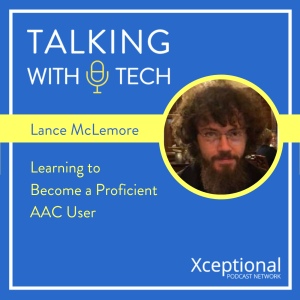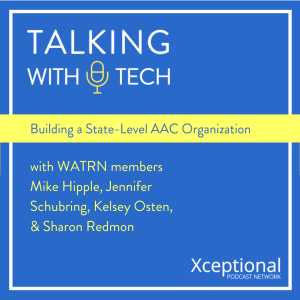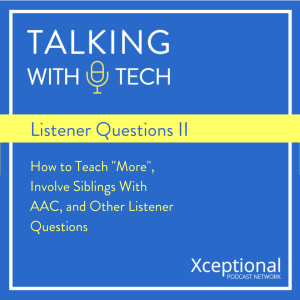Episodes

Tuesday Apr 23, 2019
Tuesday Apr 23, 2019
This week, Rachel interviews speech-language pathologist and mindfulness meditation leader Melanie Pensak! Melanie offers nature-based and home-based speech-language therapy services through her business, Destination Speech. In addition to her work as an SLP, Melanie leads wellness workshops and meditation groups, and specializes in helping therapists and parents prevent burnout and increase joy! Melanie believes that being aware of the present moment is a “superpower” that everyone can use to live life with more joy!
Three keys from this week’s episode:
🔑 Why making small changes over time often leads to the biggest results.
🔑 How mindfulness can be helpful for children, especially those with complex communication needs.
🔑 How mindfulness can be promoted in therapy through play-based activities, such as creating a focus on breathing by pretending to blow out a candle.
Links:
To learn more about Melanie, visit www.melaniepensak.com
For links to resources from this week’s episode, to listen to previous episodes, and more, visit linktr.ee/talkingwithtech!

Tuesday Apr 16, 2019
Tuesday Apr 16, 2019
This week, Talking With Tech is re-broadcasting the second half of our March 31st Facebook Live episode with Matt Hott, host of the SpeechScience podcast! Continuing where they left off last week, Rachel discusses how a AAC Clinical Speciality Certification could benefit SLPs in private practice, and why we should focus on how certification affects AAC users, not just ASHA members. Chris shares ideas about possible “microcredentials” that demonstrate expertise in particular sub-specialty areas, like eye gaze devices, least-to-most prompting, etc. Rachel notes that the Speciality Certification would expose those seeking certification to the latest evidence and best practices for AAC. Rachel also discusses the need for all clinicians to be more confident about AAC, whether or not they are certified. Matt shares why certification would give him more confidence as an SLP when working with parents and clients. Chris notes the importance of being motivated to learn, whether or not we are working towards certification. Rachel and Chris conclude by sharing their hope that the AAC Specialty Certification will support a “coaching” model that empowers communication partners to facilitate language all day long!
Links:
SpeechScience podcast: xceptionaled.com/podcasts/speech-science/
To join the Talking With Tech Facebook Group, earn CEUs, and more, visit linker.ee/talkingwithtech!
For Part 1 of our Facebook Live episode on AAC Clinical Specialty Certification, click here

Tuesday Apr 09, 2019
Tuesday Apr 09, 2019
This week, the TWT team is re-broadcasting the first half of our March 31st Facebook Live episode! Rachel, Chris, and Matt Hott of the SpeechScience podcast took questions from listeners about the ASHA AAC Clinical Specialty Certification. During this free-flowing discussion, they share concerns with the “expert” model, why Specialty Certification may help improve graduate-level AAC instruction, and how a Specialty Certification could impact private practices working with AAC. Rachel and Chris also touch on concerns about insurance payments, the need for more a collaborative approach to assessment, questions about who should be considered an “AAC Specialist”, and more!
Links:
SpeechScience podcast: https://xceptionaled.com/podcasts/speech-science/
Chris Bugaj's book, "The New Assistive Tech: Making Learning Awesome for All!": https://www.amazon.com/New-Assistive-Tech-Learning-Awesome/dp/1564846881
For Part 2 of our Facebook Live episode on AAC Clinical Specialty Certification, click here

Tuesday Apr 02, 2019
Tuesday Apr 02, 2019
If you are interested in learning about the proposed ASHA AAC Clinical Speciality Certification, don’t miss this week’s interview with Dr. Katya Hill! Before the interview, Rachel shares why her jury duty was not as bad as she had expected, and why taking a step away from work can be so helpful. Next, Rachel and Chris discuss new AAC users who repeatedly press all (or only one) of the buttons on their device, and why this doesn’t need to be actively discouraged for the behavior to fade. Finally, Chris talks about his experience touring schools to evaluate classroom seating and lighting design.
Next, Chris and Rachel interview Dr. Kayta Hill, Associate Professor at Pitt and leader in developing the new AAC Clinical Specialty Certification! First, Katya shares about how she came up with the phrase “SNUG” (spontaneous novel utterance generation) while working on her dissertation. Next, Katya discusses her role in gaining approval for an AAC Specialty Certification and why a specialty certification for AAC is being sought. Katya also covers why graduate-level AAC instruction will hopefully improve as a result. The process of developing the certification, including identifying specific AAC competencies, is also discussed.
Links:
ASHA’s page for New Specialty Areas: https://www.asha.org/Certification/specialty/Approved-Petitioning-Groups-for-New-Specialty-Areas/
Clinical AAC Research Conference at Howard University, October 17th-19th: https://aacinstitute.org/2019-caac/

Tuesday Mar 26, 2019
Tuesday Mar 26, 2019
In this week’s episode, Chris interviews proficient AAC user and Prentke Romich Company (PRC) Ambassador Lance McLemore! Before the interview, Chris is joined again by his wife, Melissa Bugaj! Melissa and Chris discuss the first ever International #ATChat, which focused on AAC and Access. Next, Melissa discusses her recent experiences with students who use AAC. Melissa shares about learning to increase wait time, how AAC devices are helping users to demonstrate competencies for alternative assessment, and how a student self-regulated his behavior by protesting on a device.
Following this discussion, Chris interviews PRC Ambassador and AAC user Lance McLemore! In Lance’s role as Ambassador, he attends conferences and speaks to different groups about his experiences using Lamp Words for Life. The interview is played in real time so our listeners can hear how quickly he accesses his device – it’s amazing! Lance shares how he taught himself to use Lamp Words for Life, how practice has helped him improve his rate, and why he believes motor planning is so important to using an AAC device successfully!
Links:
Questions and responses from the first International #ATChat on AAC and Access!
Lance has an upcoming free webinar with the Center on AAC & Autism! Register at https://prentrom.pages.salesfusion.com/Implementing-LAMP-April-Webinar-Series

Wednesday Mar 20, 2019
Wednesday Mar 20, 2019
This week, Rachel and Chris connect with Chris’ wife, Melissa Bugaj to talk about what makes a successful IEP meeting! Melissa is Dean of Special Education at Loudoun Valley High School and has lots to share about effective meetings, including the need for open and transparent communication, the importance of agendas, and why involving parents before the IEP meeting is so important! Rachel also shares about her experiences with IEP meetings, and why, whenever possible, Rachel tries to talk with a student during an IEP meeting rather than about him or her.
Following this discussion, Chris interviews Mo Buti! Mo is an advocate and instructional advocate who works with school districts and families to ensure free and appropriate public education for students with a variety of disabilities and special needs. Mo is an expert in the IEP process, and provides amazing advice about a wealth of subjects related to IEPs, including writing measurable goals, using the word “benefit” vs “require”, and the power of active listening!
Links:
Find out more about Mo Buti at her website: https://www.aiepautism.com
Rachel’s recommended video messaging app: Marco Polo
Melissa’s book recommendation: Guide to Collaboration for IEP Teams by Nicholas R.M. Martin

Tuesday Mar 12, 2019
Tuesday Mar 12, 2019
On this week’s episode Rachel talks about her impromptu solo trip to Hawaii and how she balanced both disconnecting with technology and using technology to keep her connected to friends and family. Chris opens up a broader discussion about productivity hacks and minimalism with therapy materials.
In this week’s interview, Chris talks with four members of the Wisconsin Assistive Technology Regional Network (WATRN) about creating a grassroots community to support AT & AAC. The four guests this week are WATRN Founder Mike Hipple and SLP/AT Specialists Jennifer Schubring, Kelsey Osten, and Sharon Redmon. They talk about how the defunding of Wisconsin Assistive Technology Initiative (WATI) inspired them to start a grassroots organization, WATRN, to meet the need for AT & AAC education and support in Wisconsin. Along with sharing information across the state, WATRN brings regional groups together to meet, share knowledge, and raise awareness about issues related to AAC!
Don’t forget to join the TWT FB Group where we will reveal the topic of the Live Event on March 31st 8:00 EST/ 5:00 PST!
Also, be sure not to miss Rachel’s course in the free Special Apps Update Conference taking place on March 27th at 8:00 EST/5:00 PST. You can sign up for free at www.specialappsupdate.com with the code: XEDSAU19.
We want to know what you think! You can connect with us on Twitter and Instagram (@talkingwithtech)! Also, please subscribe and post a review for us on iTunes - it helps others to find us!
Links:
Wisconsin AAC Network: www.wisconsinaacnetwork.org

Tuesday Mar 05, 2019
Tuesday Mar 05, 2019
On this week’s episode of Talking with Tech, Rachel interviews Sarah Whyte, a Certified Brain Injury Specialist and Assistive Technology Professional (ATP) specializing in AAC & AT for the adult neurogenic population. Sarah has instructed the AAC course at Vanderbilt University and led the AAC program for outpatient neurogenic rehabilitation at Vanderbilt Medical Center. She has presented on numerous occasions about AAC for the adult neurogenic population, including acute-care patients, ALS patients, and aphasia patients.
Before the interview, Chris shares an experience from work with a colleague about an eye tracking system. Rachel and Chris then briefly discuss end of life care and AAC for populations with regressing communication and motor skills. They also touch on grief and the counseling component involved in both children and adults with complex communication needs.
Links:
For Sarah's webinar on managing communication deficits with ALS patients, go to speechpath.com.
Interested in earning CEU’s by listening to “Talking With Tech”? Check out our course at bit.ly/twtcorepd.

Tuesday Feb 26, 2019
Tuesday Feb 26, 2019
On this week’s episode, Rachel, Chris and Lucas answer listener questions for a second time! Topics include ideas for teaching the word “more," how to get siblings/peers involved in therapy, and how we can support AAC curriculum for home-schooled students!
Interested in earning CEU’s by listening to “Talking With Tech”? Check out our course at bit.ly/twtcorepd.

Tuesday Feb 19, 2019
Tuesday Feb 19, 2019
On this week’s episode Rachel and Chris discuss all things related to access with their special guest, Kelly Fonner. Chris talks about his book heading up the charts and Rachel and Chris discuss their most recent webinar, “ABC’s of AAC”.
During Chris’ interview with Kelly, they talk about PODD (Pragmatic Organization Dynamic Display). PODD is a unique type of AAC system where the vocabulary is organized according to pragmatic functions. This type of system is particularly useful for children with limited access or those who might benefit from partner-assisted communication.
Links:
Rachel & Chris’s Course “ABCs of AAC”: https://xceptionaled.com/course/abcs-of-aac/
We Speak PODD YouTube Channel: https://www.youtube.com/channel/UCfvD20l2wn-fS2Ar4bdTXZg
Kelly Fonner: www.kellyfonner.com

Join AAC experts Rachel Madel and Chris Bugaj as they dive into a weekly discussion about all things AAC (Augmentative and Alternative Communication). Every episode they deliver practical resources, clinical guidelines and relevant research to help clinicians better utilize technology for individuals with complex communication needs.
Episodes include interviews with industry thought-leaders, clinicians, parents, researchers and app developers to keep you on the pulse of the educational technology scene and better support communication through the use of technology.


